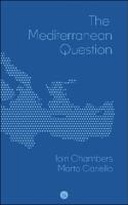Explore

Whose Mediterranean are we talking about? What languages are most appropriate to its reception and understanding? With two-thirds constituted by the histories and cultures of its African and Asian shorelines and hinterlands, and its principal spoken language – in all its variants and dialects – being Arabic, then the Mediterranean clearly exceeds the Western frame of explanation. Without pretending to speak for or in the name of these ignored and repressed dimensions, The Mediterranean Question explores the gap between the Mediterranean reduced to a European and Western mirror by listening and attending to some of those other histories, cultures, and lives. How to puncture prevalent European understandings of the Mediterranean? The colonizing impulse inscribed in Western historiography cannot be undone simply by adding previously repressed and unacknowledged histories. Instead, a re-examination of the premises and procedures that produced such exclusions leads to a valuable change in coordinates. An order of knowledge that creates subaltern objects of study to reconfirm European centrality and subjectivity is interrogated. Insisting on a politics of registration and listening, further critical incentives drawn from the trans-local dissemination of literature, music, cinema, and the visual arts can be deployed to query existing representations. In this more ragged and open series of maps, there lies no complete picture but rather a challenge to the violence of existing explanations. Insisting that present-day knowledge is sustained in asymmetrical relations of power, The Mediterranean Question promotes a reconfiguration of historical archives and cultural ties, casting a critical light on the deeper histories that have made the Mediterranean, Europe, and Western modernity. Proposing a series of intersecting analyses that underline the colonial constitution of the present and its mobile and creolized formation, Chambers and Cariello seek to establish new coordinates for thinking and practicing the possibilities of another Mediterranean.
This book is included in DOAB.
Why read this book? Have your say.
You must be logged in to comment.
Rights Information
Are you the author or publisher of this work? If so, you can claim it as yours by registering as an Unglue.it rights holder.Downloads
This work has been downloaded 6 times via unglue.it ebook links.
- 6 - pdf (CC BY-NC-SA) at OAPEN Library.
Keywords
- Arab women poets
- Cultural Studies
- Mediterranean Sea
- migration
- Modern History
- Music
- thema EDItEUR::1 Place qualifiers::1Q Other geographical groupings: Oceans and seas, historical, political etc::1QS Oceans and seas::1QSM Mediterranean Sea
- thema EDItEUR::J Society and Social Sciences::JB Society and culture: general::JBC Cultural and media studies::JBCC Cultural studies::JBCC7 Cross-cultural / Intercultural studies and topics
- thema EDItEUR::N History and Archaeology::NH History::NHT History: specific events and topics::NHTB Social and cultural history
- thema EDItEUR::N History and Archaeology::NH History::NHT History: specific events and topics::NHTQ Colonialism and imperialism
- thema EDItEUR::N History and Archaeology::NH History::NHT History: specific events and topics::NHTR National liberation and independence::NHTR1 Decolonisation and postcolonial studies
- Visual Arts
Links
DOI: 10.53288/0539.1.00Editions

